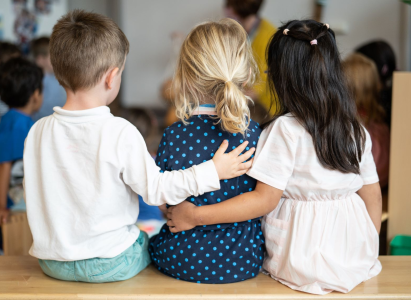Ludwik Rajchman, the founder of UNICEF, who, like all those of his generation had seen the horrors of World War One, along with a small group of pioneers, had a vision for a school where children of different nationalities, even those at war with one another, would grow up together in peace. Rajchman was animated by that simple anti-war idea “never again”.
A strong imprint of the First World War was the unbridled nationalism of the late 19th Century that had swollen to the point of ultimately leading to the outbreak of full-blown conflict: as empires became nation states, the belligerence and political arrogance of European leaders, curried into a nationalistic fervour and propaganda, led an entire generation to be swept up by the deathly promise of war as a supposedly necessary act to cleanse society of its decadence. This was the doctrine of schools of art, such as the Italian Futurists, and English pro-war poetry, such as those jingoistic hymns composed by Henry Newbolt and Rudyard Kipling.
But there was no cleansing in the Great War: there was unimaginable cruelty, suffering and collective psychic distress as warfare became mechanised, poisoned gases were released into the lungs of young men, Moroccan and Senegalese infantrymen were sent to their deaths and would be refused treatment by nurses on the front, where soldiers too terrified to leap over the trenches, would be killed by their own captains.
The lessons learnt of WW1, striking and realistic like the haunting images of Erich Maria Remarque’s fiction or the nightmarish latter poems of Wilfred Owen, showed that future educational lessons had to steer away from extreme nationalism, and at all costs not to fall into that deathtrap of glamorising war, of propagandising it, of turning another person into a unidimensional enemy, of suggesting that there could be anything good in war.
A number of key decisions were taken early on to reinforce this idea: the school would commemorate Armistice Day with a particular intent and solemnity; students would learn at least two languages, to unlock through such cultural and linguistic duality, a richer appreciation of the other; assemblies were frequent and dedicated to global affairs with the school’s leadership embracing openly and vividly a message of peace and the overarching message to students was that the crime of crimes was to belittle anyone because of their national origins.
Today, the macabre shadow of war lingers. As lives are lost and political discourses are inflamed, reactions to wars have been the source of disagreement and conflict in schools and, more especially, universities. Often, these institutions will struggle to position themselves clearly and in such a way that students see mirrored in the administration the discourse they need to hear to know clearly and without a hint of ambivalence, that peace can be the only path to salvation. The dread of battlefields can come across as sanitised and even entertaining on social media, ideological positions can lead to students taking on dogmatic and even extreme positions if there is no pedagogical curatorship, no guidance, no voice of wisdom to remind them of the lessons of 100 years: never again, plus jamais la guerre!
By turning to the original credo of the international school of Geneva, and the 100 year old construct of international education for that matter, some solace might be sought: let's bring our communities of learners together under the umbrella of our common human ancestry and humanity. By educating for peace, messaging openly about and for peace, by enhancing multiple perspectives within students, by celebrating an appreciation of multiple identities, we must continue the initial project of Rajchman and the original pioneers who ideated the project of international education. This can mean commemorating the international day of peace openly and intentionally, celebrating peace makers and exposing students to presentations by those whose life work is dedicated to peace.
Above all, may there be no ambiguity about the values that all international schools enhance as part of their mission: this is needed as much today in 2024 as it was in 1924 and is exemplified clearly in a much-quoted phrase from Marie-Thérèse Maurette, the school’s iconic second director who led the International School of Geneva from 1929 to 1948. She said this:
“You can argue; you will inevitably do it; It happens to all children and some adults. But, no matter how angry you are, you should never use nationality or race as a term of insult. It is, in this school, the crime of crimes.”
Conrad Hughes
Director General
23 July 2024
